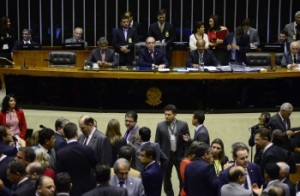MP approved that increases tax on drinks and computer products

The Plenary of the Chamber of Deputies approved on Tuesday (15) Provisional Measure 690/15, which increases the taxation of so-called hot drinks (wine and spirits) and computer products (computers, tablets, smartphones, etc.). The matter, approved in the form of the opinion of Senator Humberto Costa (PT-PE), will be sent for sanction.
All planned changes will take effect from January 1st of next year. According to the original text of the MP, the increase in taxes would occur on December 1 of this year. As the MP has the force of law, the difference between the taxes originally provided for and those approved when the text becomes law will be subject to compensation.
According to the approved text, wines and spirits will pay a lower rate of the Tax on Industrialized Products (IPI). Instead of 10% or 20% originally proposed by the MP for wines, they will apply 6% in 2016 and 5% from 2017 onwards.
Amendment by Deputy Pauderney Avelino (DEM-AM) included in these rates the liqueurs, which are on the list of other drinks defined by Decree 8.512 / 15 with a rate of 30%, such as gin and vodka. The decree imposes 15% for vermouths.
In the MP, rum and spirits will be taxed at 17%, while in the original text they were 30%.
Product Value
The percentages will be applied on the value of the product (ad valorem). Today, according to Law 7.798 / 89, the tax is charged at a fixed value on the quantity produced (ad rem). “This regime creates distortions in free competition. There are, for example, beverages of extremely high commercial value, with a total tax of only R $ 0,73, ”argued Costa.
According to the Federal Revenue Service, although the change in the taxation model should generate additional revenues, estimated at around R $ 1 billion in 2016, the change intends to simplify the collection process through taxation with a traditional model, already applied to the rest of the tax system. economy.
The new taxation model also equates the distributor linked to the industrial / importer to the industrial taxpayer in order to balance the competition and end distortions.
Wine stamps
As a result of the changes, the IRS adopted another tax simplification measure, exempting producers of domestic and imported wines from sealing their products and from registering them in a special register maintained by the agency.
Computer Technology
As for the Digital Inclusion Program, which exempts computers, smartphones, routers and tablets from charging PIS / Pasep and Cofins, the increase will be smaller from 2017.
Currently, these products have a zero rate until December 31, 2018, as stipulated by Law 13.097 / 15, derived from Provisional Measure 656, of October 2014.
According to the text approved for MP 690, as of January 1, 2016, products will pay a rate of around 10% on retail sales. However, in 2017 and 2018 they will be reduced by 50% and, from 2019 onwards, it will be back to zero.
The government's initial expectation with the increase in contributions was to raise an extra amount of R $ 6,7 billion. On the other hand, representatives of the sector consider the estimate incorrect due to the drop in sales even before the increase in the tax.
Copyright
Another tax increase provided for in MP 690 was Income Tax and Social Contribution on Net Income (CSLL) levied on copyright and image revenue.
However, amendment by deputy Otavio Leite (PSDB-RJ) removed this increase from the text, which prevented the collection of these taxes only on 32% of the revenue obtained by the legal entity created specifically to seek more favorable taxation in relation to the tax levied on the individual .
The government leader, deputy José Guimarães (PT-CE), even protested with the allied base that followed the opposition's proposal. The government expected to raise R $ 620 million more in 2016 with this new system of copyright.
Cold drinks
Another amendment approved in plenary, authored by Deputy Junior Marreca (PEN-MA), made changes in the use of presumed credit by wholesalers who sell cold drinks (beer and soda, for example).
The amendment changes Law 13.097 / 15, originated from MP 656/14, which introduced a new model of taxation for the sector, for which he started to pay PIS / Pasep e Cofins with rates on the sale value and no longer on the volume of production or an average price.
The text approved on Tuesday by the Plenary allows wholesalers to establish a presumed credit on the purchase price of their stocks acquired in the domestic market that were in their possession on April 30, 2015, the last day of the old tax mechanism.
The amendment also provides that the value of the freight will only be included in the calculation base for cold drinks if the producing company or the wholesaler maintains a legal relationship with the carrier, as in the situations of subsidiary and controlling shareholder, participation in the share capital or presence of partners in the positions steering.
INTEGRATION OF THE PROPOSAL:
Edition - Pierre Triboli



